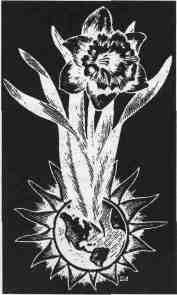
101 Ways To Live More Ecologically
Earth Day '96 takes place on Monday, April 22,
but you can do something to improve the Earth's
ecology every day of your life.
Here is a partial list of some ways you
can live with greater concern for ecological balance.
Post it where others can see it too.
1. Avoid disposable in favor of reusable
items.
2. Avoid drying rags in a clothes dryer.
3. Avoid power appliances when handpower works.
4. Avoid highly processed foods.
5. Avoid using styrofoam—it can't be recycled.
6. Avoid watering driveways and sidewalks.
7. Be responsible and creative with leftover foods.
8. Buy in bulk goods to reduce wasted packaging.
9. Buy energy efficient electric appliances.
10. Buy foods without additives.
11. Buy foods without preservatives.
12. Buy food and goods from sources
you trust
13. Buy large quantities to reduce shopping trips.
14. Buy living Christmas trees.
15. Buy locally grown food and produce.
16. Buy organic, pesticide-free foods.
17. Compost your food scraps.
18. Discover and protect watersheds in your area,
19. Don't burn trash or other smoky materials.
20. Drain cooking grease onto paper bags, not paper towels.
21. Drive a fuel-efficient car.
22. Drive less: walk, bicycle, carpooland use public transportation.
|
23. Eat foods low on the food chain;
avoid meat.
24. Eat more natural, nutritious foods.
25. Educate elected representatives on ecology.
26. Exercise regularly.
27. Explore and learn about your bioregion.
28. Grow your own food, even a small amount.
29. Hang dry some or all of your clothes.
30. Heat your home less and wear warmer clothes.
31. Heat your home more with renewable energies.
32. Hold a potluck dinner to discuss local ecology.
33. If you use a dishwasher, turn off the drying cycle.
34. Install a water-conserving device in your toilets.
35. Install a water-conserving showerhead.
36. Insulate your home to maximum efficiency.
37. Invest for social responsibility as well as profit.
38. Invest in solar power, where practical.
39. Invest in well-made, long-lived clothing.
40. Keep hazardous chemicals in safe containers.
41. Keep appliance motors well adjusted for efficiency.
42. Mend and repair rather than discard and replace.
43. Oppose meddling in ecological balance.
44. Oppose private development of special areas.
45. Oppose roadside use of defoliants.
46. Organize or join a neighborhood toy exchange.
|
Illinois Parks & Recreation * March/April 1996 * 21
47. Pick up litter along streets and highways.
48. Plant native trees and shrubs around your home.
49. Plant trees throughout your community.
50. Plant your living Christmas tree.
51. Practice preventive health care.
52. Practice responsible family planning.
53. Prepare only as much food as will be eaten.
54. Protect your favorite distinctive natural areas.
55. Purchase goods in reusable/recyclable containers.
56. Put a catalytic converter on your wood stove.
57. Put toxic substances out of reach of children.
58. Recycle aluminum.
59. Recycle glass.
60. Recycle newspaper.
61. Recycle old clothes.
62. Recycle plastic.
63. Recycle used motor oil.
64. Recycle your unneeded items.
65. Re-use paper bags.
66. Re-use plastic bags for storage and waste.
67. Save up for full loads in clothes washers.
68. Save up for full loads in dishwasher.
69. Shop by phone, then go pick up your purchases.
70. Speak out about your values in community groups.
71. Support efficient energy sources in your bioregion.
72. Support elected representatives on ecological issues.
73. Support energy conservation in your bioregion.
|
74. Support global ecological improvement efforts.
75. Support local credit unions.
76. Support local merchants before large chains.
77. Support neighborhood food cooperatives.
78. Support proper waste water and sewage treatment.
79. Support the cultural diversity in your bioregion.
80. Support the plants and animals in your community.
81. Take shorter showers.
82. Teach your children ecological wisdom.
83. Turn down the thermostat on your water heater.
84. Turn off the lights when not needed.
85. Turn off the water while you brush your teeth.
86. Use biodegradable soaps and detergents.
87. Use cloth diapers.
88. Use cloth table napkins.
89. Use less tapwater whenever possible.
90. Use non-toxic pest control.
91. Use only medications you trust/understand.
92. Use rags or towels instead of paper.
93. Use rechargeable batteries.
94. Use the second side of paper for scratch paper.
95. Use water from cooking vegetables to make soup.
96. Volunteer for work in a community garden.
97. Volunteer to maintain local parks and wilderness.
98. Wash clothes in cold water.
99. Wash dishes in still, not running water.
100. Weather-seal your home.
101. Work to unlearn poor ecological habits.
|
Compiled by the Green Party. For information about Greens
in your area write: Committees of Correspondence Clearinghouse,
P.O. Box 30208, Kansas City, MO 64112.
22 * Illinois Parks & Recreation * March/April 1996
Illinois Periodicals Online (IPO) is a digital imaging project at the
Northern Illinois University Libraries funded by the Illinois State Library
Sam S. Manivong, Illinois Periodicals Online Coordinator
|
|

